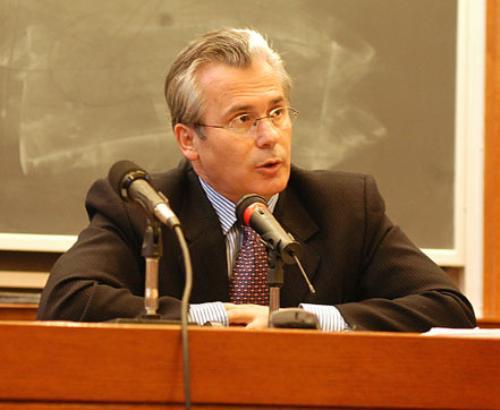
News
Cambridge Residents Slam Council Proposal to Delay Bike Lane Construction

News
‘Gender-Affirming Slay Fest’: Harvard College QSA Hosts Annual Queer Prom

News
‘Not Being Nerds’: Harvard Students Dance to Tinashe at Yardfest

News
Wrongful Death Trial Against CAMHS Employee Over 2015 Student Suicide To Begin Tuesday

News
Cornel West, Harvard Affiliates Call for University to Divest from ‘Israeli Apartheid’ at Rally
Judge Urges Unified Front Against Terror

Spanish judge Baltasar Garzon, famous for indicting former Chilean dictator Augusto Pinochet, spoke to a crowd of 150 at Harvard Law School last night, asking for greater international cooperation in combating terrorism.
His talk, entitled “On Terrorism, Freedom and Security: A European Perspective,” stressed cutting through the legal and bureaucratic red tape that has shackled investigations into terrorist organizations.
In his speech, delivered in Spanish and translated simultaneously, Garzon described the March 11 bombing in Madrid as the “largest terrorist attack in modern European history.” ands he said that the nature of the threat from al Qaeda—and terrorism in general—was evolving rapidly.
“The head of the snake has multiplied, and will continue to multiply,” he said, referring to the growth of autonomous terrorist cells throughout the world. Spain had been almost able to wipe out ETA, the Basque terrorist group which operates with the “hierarchal, pyramidal structure” of conventional terrorist organizations, Garzon said.
And the new terrorists no longer recruit from only the poor and the uneducated, he said. The middle class and the educated are also joining the ranks of al Qaeda and its support organizations, he added.
“The United States has adopted a military response to terrorism...one that is outside channels that already exist,” he said. “On the other hand, in Europe, we are trying to develop existing legislation, using channels that already exist.” The second method is more effective, he believes, since it tries to explore “all options that exist within the rule of law—a rule of law that is the essence of all our nations.”
The problem lies in implementation of these laws, Garzon said. “We do not have an effectiveness of even 30 percent of what can be achieved, because we have not interpreted and applied the laws that already exist.”
In response to a question from the audience, Garzon said that he did not support Spain’s participation in the war in Iraq, and that he believed that the war was illegal and unsupported by evidence. He also said that the American detention of al Qaeda prisoners in Guantanamo Bay was illegal. “They are deprived of basic human rights. Systematic interrogation without legal counsel, isolation, and prolonged arrest without cause are all illegal.”
His main focus, however, was improved coordination among countries investigating terrorism. “Intelligence is there for the benefit of man, not to hinder him,” Garzon said.
Democratic countries should not be suspicious of each other while sharing information on terrorist activities, and should be prompt in their responses to other countries’ requests. Of the 20 commissions Spain had sent to other countries seeking information about the March 11 explosions, he said that only three had returned.
“If responses were provided real-time, effectiveness would improve considerably. Let’s not become one more bureaucratic agency that says, ‘Sensitive information—we can’t share it.’ In that case, once again, we shall find ourselves having to regret that we didn’t act on time,” he said.
After the speech, his comments on Iraq remained on the minds of many in the audience.
“Given his political background, it wasn’t unexpected,” said Daniel J. Epstein, a graduate student in political science. Garzon served from 1993 to 1994 as a member of the Socialist Party in the lower house of the Spanish Cortes—the national legislature in Spain.
“I completely agree with his views on Iraq. And judging from the reaction of the audience, it’s great to see that so many others do as well,” said Emily Schaffer, a graduate of Harvard Law School.
Want to keep up with breaking news? Subscribe to our email newsletter.
